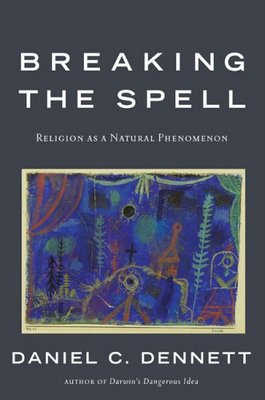Breaking The Spell

It is relatively easy to take a firm stance and not care about subsequent social divisiveness, while much harder to attempt understanding of the complexity of an issue, what is known and unknown, and discuss one's viewpoint in a manner that allows for, and stimulates, further discussion among rational people. Thus, Dennett uses caution in his investigation and does not propose to have all the answers, but he suggests some useful ways of thinking about how to get them (if it possible). Dennett realizes that there are good spells and bad spells, and at this moment it is hard to tell which one religion might be. There are two main spells discussed: (a) the 'don't even think about questioning religion' spell and (b) the belief in religion itself. As it is unknown whether religion is good or bad, the first spell must be broken. As for maintaining or rejecting the second spell, that is what we should try to figure out.
Using his broad, yet deep, knowledge about philosophy and biology, Dennett describes how traits that are more likely to be possessed by religious people could have arisen in our evolutionary past, as well as other aspects of ritual, belief, belief in belief and morality without religion. Do not expect a fully developed theory, but do anticipate a fully developed analysis of what kinds of theories currently exist and what kinds of theories we would likely want to pursue.
As a way of engaging the religious, I found two of Dennett's arguments particularly cogent:
(1) If your God has personally told you how the world is and how we should act, please tell the rest of us because He has not done that (yet) to the rest of us. Of course, realize that the rest of us will want rational arguments and evidence to be convinced; a request that is only fair considering what is at stake. (and if the reasons you have are truly good ones, every rational person shall join you soon.)
(2) Even if it is true that your God is the 'right one,' aren't you at all curious that so many people (billions!) have it wrong? Doesn't it make sense to study other religions, why other followers follow them and why they are so sure they have it right. (If you truly do not care, then you have already removed yourself from a global dialogue.)
It is difficult to argue with one of Dennett's final suggestions: to increase awareness and education of all religions. Such an occurrence would allow for greater understanding of cultural practices, underlying factors in geopolitical situations, and might allow for useful inter-religious comparisons.
Breaking the Spell is a reasoned, patient and intelligent examination of (the ways of theorizing about) religion as a natural phenomenon. As the topic is extremely important and this is Dennett's most accessible work, I highly recommend you read it.
Go go go! :)
Using his broad, yet deep, knowledge about philosophy and biology, Dennett describes how traits that are more likely to be possessed by religious people could have arisen in our evolutionary past, as well as other aspects of ritual, belief, belief in belief and morality without religion. Do not expect a fully developed theory, but do anticipate a fully developed analysis of what kinds of theories currently exist and what kinds of theories we would likely want to pursue.
As a way of engaging the religious, I found two of Dennett's arguments particularly cogent:
(1) If your God has personally told you how the world is and how we should act, please tell the rest of us because He has not done that (yet) to the rest of us. Of course, realize that the rest of us will want rational arguments and evidence to be convinced; a request that is only fair considering what is at stake. (and if the reasons you have are truly good ones, every rational person shall join you soon.)
(2) Even if it is true that your God is the 'right one,' aren't you at all curious that so many people (billions!) have it wrong? Doesn't it make sense to study other religions, why other followers follow them and why they are so sure they have it right. (If you truly do not care, then you have already removed yourself from a global dialogue.)
It is difficult to argue with one of Dennett's final suggestions: to increase awareness and education of all religions. Such an occurrence would allow for greater understanding of cultural practices, underlying factors in geopolitical situations, and might allow for useful inter-religious comparisons.
Breaking the Spell is a reasoned, patient and intelligent examination of (the ways of theorizing about) religion as a natural phenomenon. As the topic is extremely important and this is Dennett's most accessible work, I highly recommend you read it.
Go go go! :)



0 Comments:
Post a Comment
<< Home